The functions of Participle I in the sentence

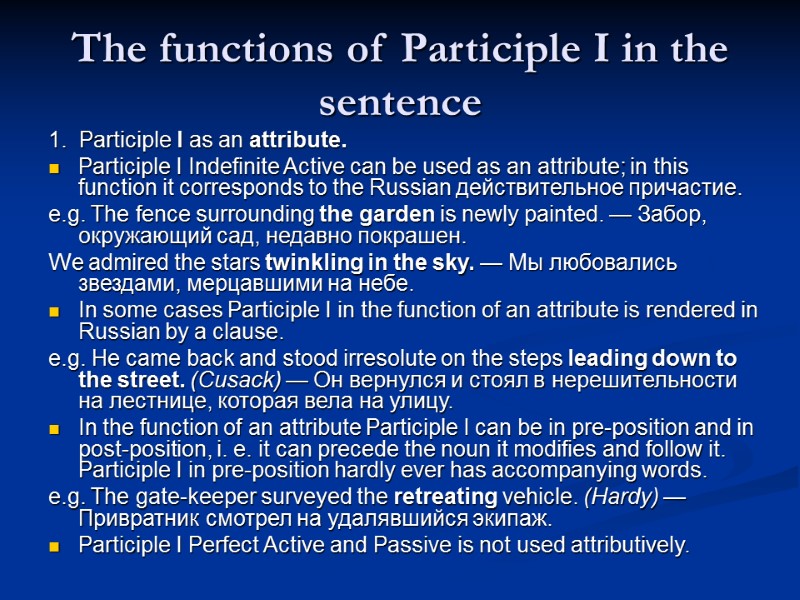
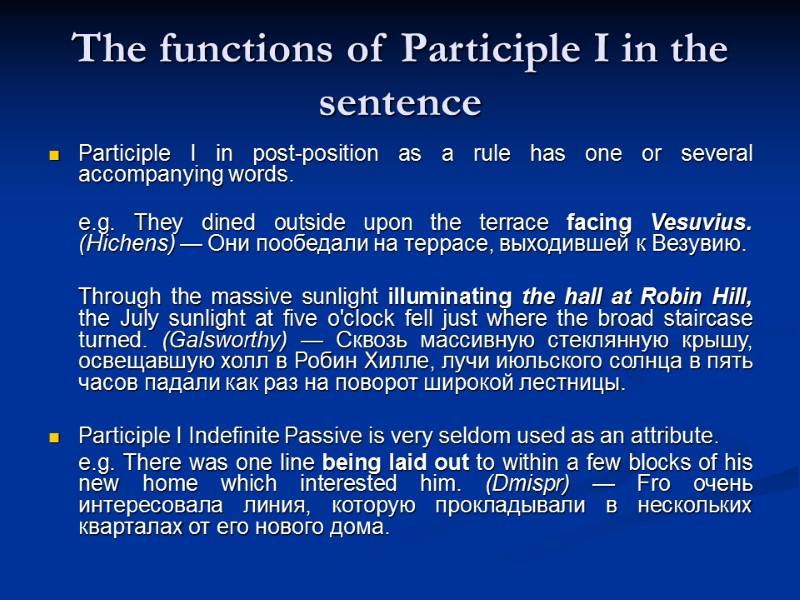
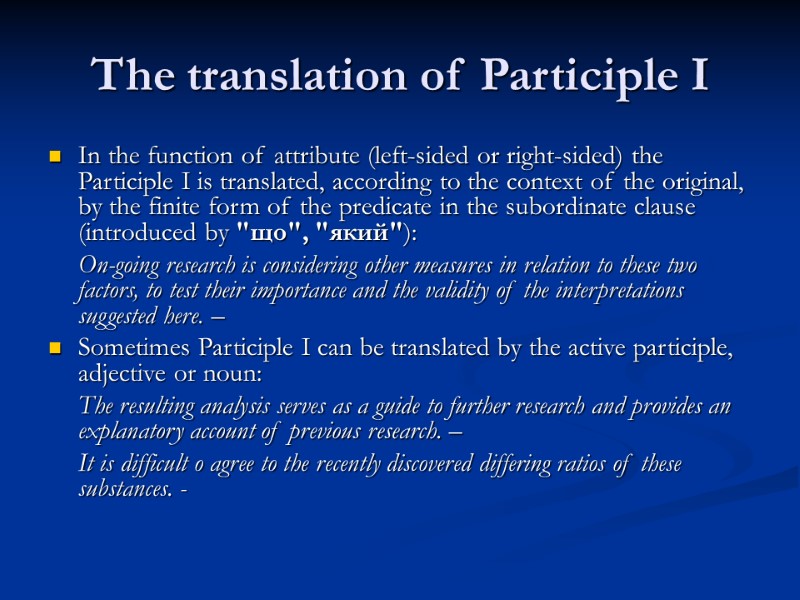
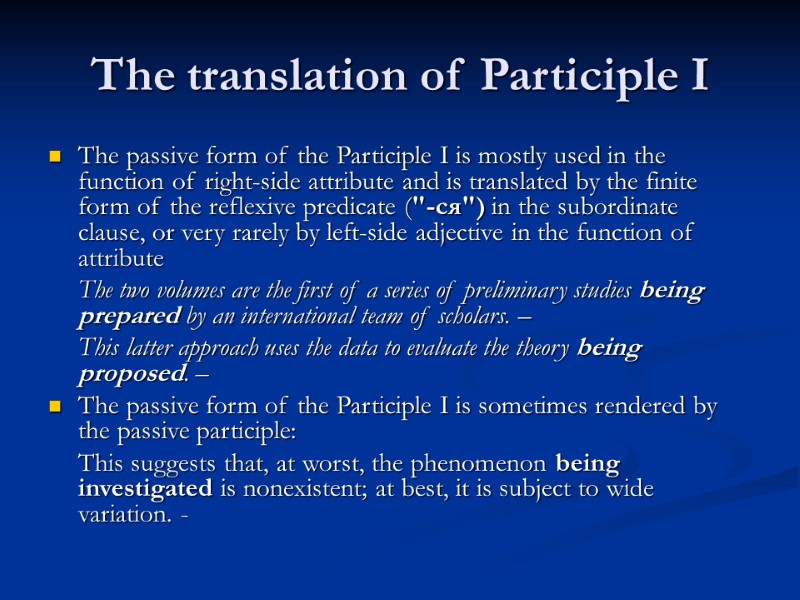
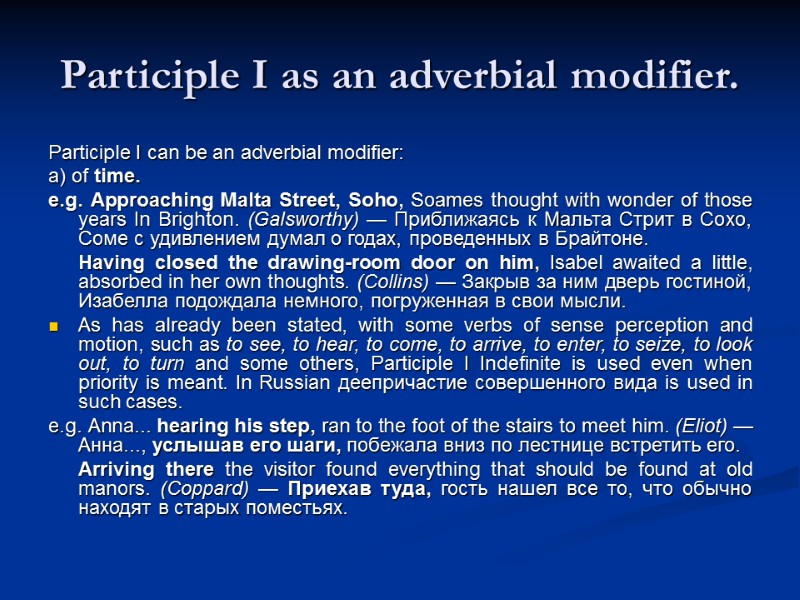
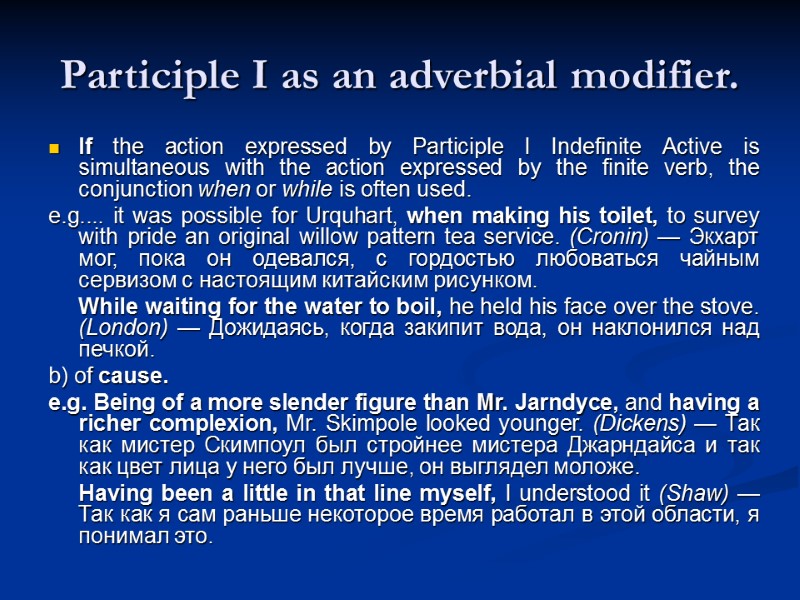
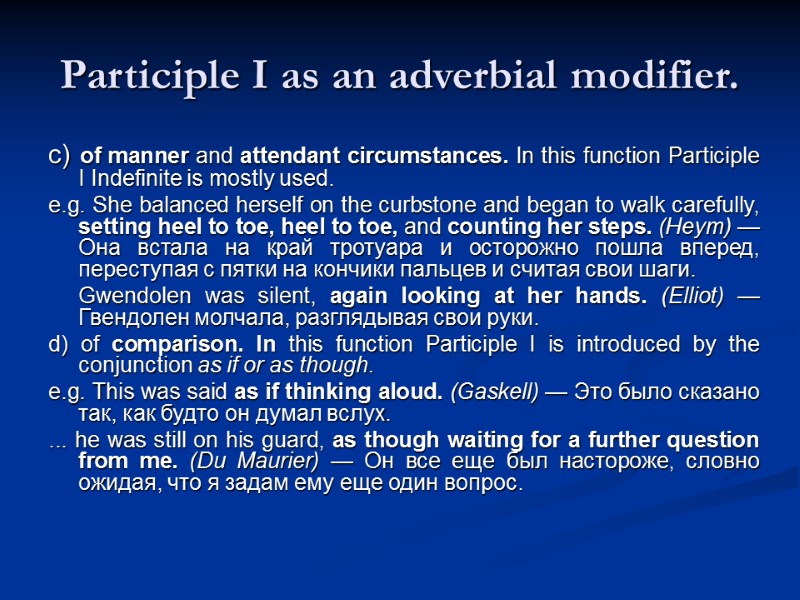
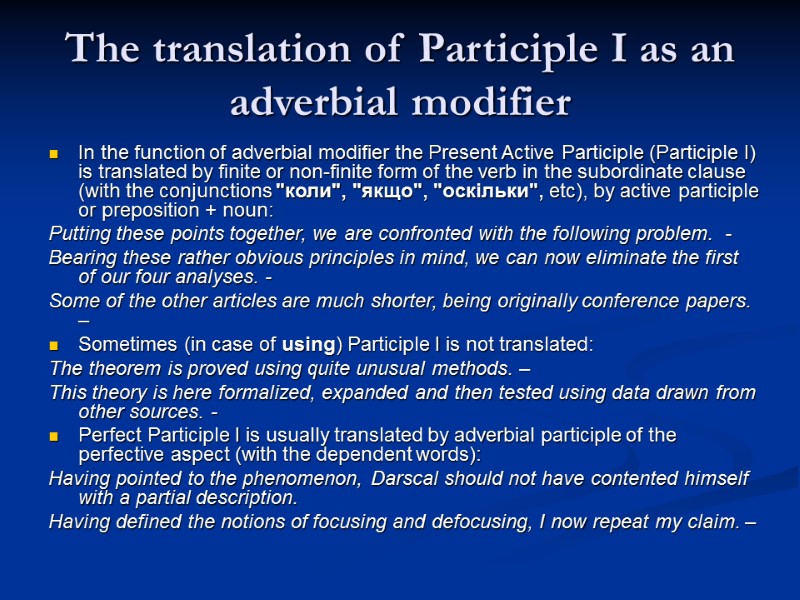
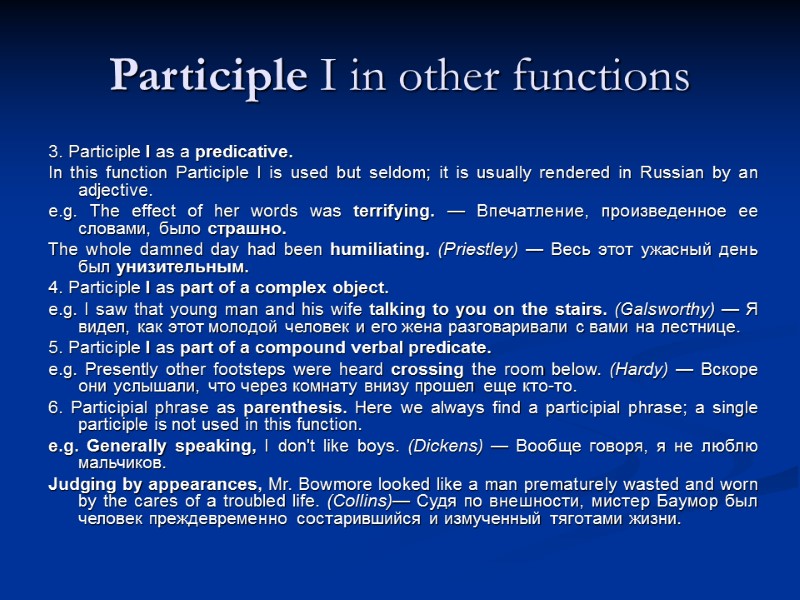
18760-verbals-2.ppt
- Количество слайдов: 9
 The functions of Participle I in the sentence 1. Participle I as an attribute. Participle I Indefinite Active can be used as an attribute; in this function it corresponds to the Russian действительное причастие. e.g. The fence surrounding the garden is newly painted. — Забор, окружающий сад, недавно покрашен. We admired the stars twinkling in the sky. — Мы любовались звездами, мерцавшими на небе. In some cases Participle I in the function of an attribute is rendered in Russian by a clause. e.g. He came back and stood irresolute on the steps leading down to the street. (Cusack) — Он вернулся и стоял в нерешительности на лестнице, которая вела на улицу. In the function of an attribute Participle I can be in pre-position and in post-position, i. e. it can precede the noun it modifies and follow it. Participle I in pre-position hardly ever has accompanying words. e.g. The gate-keeper surveyed the retreating vehicle. (Hardy) — Привратник смотрел на удалявшийся экипаж. Participle I Perfect Active and Passive is not used attributively.
The functions of Participle I in the sentence 1. Participle I as an attribute. Participle I Indefinite Active can be used as an attribute; in this function it corresponds to the Russian действительное причастие. e.g. The fence surrounding the garden is newly painted. — Забор, окружающий сад, недавно покрашен. We admired the stars twinkling in the sky. — Мы любовались звездами, мерцавшими на небе. In some cases Participle I in the function of an attribute is rendered in Russian by a clause. e.g. He came back and stood irresolute on the steps leading down to the street. (Cusack) — Он вернулся и стоял в нерешительности на лестнице, которая вела на улицу. In the function of an attribute Participle I can be in pre-position and in post-position, i. e. it can precede the noun it modifies and follow it. Participle I in pre-position hardly ever has accompanying words. e.g. The gate-keeper surveyed the retreating vehicle. (Hardy) — Привратник смотрел на удалявшийся экипаж. Participle I Perfect Active and Passive is not used attributively.
 The functions of Participle I in the sentence Participle I in post-position as a rule has one or several accompanying words. e.g. They dined outside upon the terrace facing Vesuvius. (Hichens) — Они пообедали на террасе, выходившей к Везувию. Through the massive sunlight illuminating the hall at Robin Hill, the July sunlight at five o'clock fell just where the broad staircase turned. (Galsworthy) — Сквозь массивную стеклянную крышу, освещавшую холл в Робин Хилле, лучи июльского солнца в пять часов падали как раз на поворот широкой лестницы. Participle I Indefinite Passive is very seldom used as an attribute. e.g. There was one line being laid out to within a few blocks of his new home which interested him. (Dmispr) — Fro очень интересовала линия, которую прокладывали в нескольких кварталах от его нового дома.
The functions of Participle I in the sentence Participle I in post-position as a rule has one or several accompanying words. e.g. They dined outside upon the terrace facing Vesuvius. (Hichens) — Они пообедали на террасе, выходившей к Везувию. Through the massive sunlight illuminating the hall at Robin Hill, the July sunlight at five o'clock fell just where the broad staircase turned. (Galsworthy) — Сквозь массивную стеклянную крышу, освещавшую холл в Робин Хилле, лучи июльского солнца в пять часов падали как раз на поворот широкой лестницы. Participle I Indefinite Passive is very seldom used as an attribute. e.g. There was one line being laid out to within a few blocks of his new home which interested him. (Dmispr) — Fro очень интересовала линия, которую прокладывали в нескольких кварталах от его нового дома.
 The translation of Participle I In the function of attribute (left-sided or right-sided) the Participle I is translated, according to the context of the original, by the finite form of the predicate in the subordinate clause (introduced by "що", "який"): On-going research is considering other measures in relation to these two factors, to test their importance and the validity of the interpretations suggested here. – Sometimes Participle I can be translated by the active participle, adjective or noun: The resulting analysis serves as a guide to further research and provides an explanatory account of previous research. – It is difficult o agree to the recently discovered differing ratios of these substances. -
The translation of Participle I In the function of attribute (left-sided or right-sided) the Participle I is translated, according to the context of the original, by the finite form of the predicate in the subordinate clause (introduced by "що", "який"): On-going research is considering other measures in relation to these two factors, to test their importance and the validity of the interpretations suggested here. – Sometimes Participle I can be translated by the active participle, adjective or noun: The resulting analysis serves as a guide to further research and provides an explanatory account of previous research. – It is difficult o agree to the recently discovered differing ratios of these substances. -
 The translation of Participle I The passive form of the Participle I is mostly used in the function of right-side attribute and is translated by the finite form of the reflexive predicate ("-ся") in the subordinate clause, or very rarely by left-side adjective in the function of attribute The two volumes are the first of a series of preliminary studies being prepared by an international team of scholars. – This latter approach uses the data to evaluate the theory being proposed. – The passive form of the Participle I is sometimes rendered by the passive participle: This suggests that, at worst, the phenomenon being investigated is nonexistent; at best, it is subject to wide variation. -
The translation of Participle I The passive form of the Participle I is mostly used in the function of right-side attribute and is translated by the finite form of the reflexive predicate ("-ся") in the subordinate clause, or very rarely by left-side adjective in the function of attribute The two volumes are the first of a series of preliminary studies being prepared by an international team of scholars. – This latter approach uses the data to evaluate the theory being proposed. – The passive form of the Participle I is sometimes rendered by the passive participle: This suggests that, at worst, the phenomenon being investigated is nonexistent; at best, it is subject to wide variation. -
 Participle I as an adverbial modifier. Participle I can be an adverbial modifier: a) of time. e.g. Approaching Malta Street, Soho, Soames thought with wonder of those years In Brighton. (Galsworthy) — Приближаясь к Мальта Стрит в Сохо, Соме с удивлением думал о годах, проведенных в Брайтоне. Having closed the drawing-room door on him, Isabel awaited a little, absorbed in her own thoughts. (Collins) — Закрыв за ним дверь гостиной, Изабелла подождала немного, погруженная в свои мысли. As has already been stated, with some verbs of sense perception and motion, such as to see, to hear, to come, to arrive, to enter, to seize, to look out, to turn and some others, Participle I Indefinite is used even when priority is meant. In Russian деепричастие совершенного вида is used in such cases. e.g. Anna... hearing his step, ran to the foot of the stairs to meet him. (Eliot) — Анна..., услышав его шаги, побежала вниз по лестнице встретить его. Arriving there the visitor found everything that should be found at old manors. (Coppard) — Приехав туда, гость нашел все то, что обычно находят в старых поместьях.
Participle I as an adverbial modifier. Participle I can be an adverbial modifier: a) of time. e.g. Approaching Malta Street, Soho, Soames thought with wonder of those years In Brighton. (Galsworthy) — Приближаясь к Мальта Стрит в Сохо, Соме с удивлением думал о годах, проведенных в Брайтоне. Having closed the drawing-room door on him, Isabel awaited a little, absorbed in her own thoughts. (Collins) — Закрыв за ним дверь гостиной, Изабелла подождала немного, погруженная в свои мысли. As has already been stated, with some verbs of sense perception and motion, such as to see, to hear, to come, to arrive, to enter, to seize, to look out, to turn and some others, Participle I Indefinite is used even when priority is meant. In Russian деепричастие совершенного вида is used in such cases. e.g. Anna... hearing his step, ran to the foot of the stairs to meet him. (Eliot) — Анна..., услышав его шаги, побежала вниз по лестнице встретить его. Arriving there the visitor found everything that should be found at old manors. (Coppard) — Приехав туда, гость нашел все то, что обычно находят в старых поместьях.
 Participle I as an adverbial modifier. If the action expressed by Participle I Indefinite Active is simultaneous with the action expressed by the finite verb, the conjunction when or while is often used. e.g.... it was possible for Urquhart, when making his toilet, to survey with pride an original willow pattern tea service. (Cronin) — Экхарт мог, пока он одевался, с гордостью любоваться чайным сервизом с настоящим китайским рисунком. While waiting for the water to boil, he held his face over the stove. (London) — Дожидаясь, когда закипит вода, он наклонился над печкой. b) of cause. e.g. Being of a more slender figure than Mr. Jarndyce, and having a richer complexion, Mr. Skimpole looked younger. (Dickens) — Так как мистер Скимпоул был стройнее мистера Джарндайса и так как цвет лица у него был лучше, он выглядел моложе. Having been a little in that line myself, I understood it (Shaw) — Так как я сам раньше некоторое время работал в этой области, я понимал это.
Participle I as an adverbial modifier. If the action expressed by Participle I Indefinite Active is simultaneous with the action expressed by the finite verb, the conjunction when or while is often used. e.g.... it was possible for Urquhart, when making his toilet, to survey with pride an original willow pattern tea service. (Cronin) — Экхарт мог, пока он одевался, с гордостью любоваться чайным сервизом с настоящим китайским рисунком. While waiting for the water to boil, he held his face over the stove. (London) — Дожидаясь, когда закипит вода, он наклонился над печкой. b) of cause. e.g. Being of a more slender figure than Mr. Jarndyce, and having a richer complexion, Mr. Skimpole looked younger. (Dickens) — Так как мистер Скимпоул был стройнее мистера Джарндайса и так как цвет лица у него был лучше, он выглядел моложе. Having been a little in that line myself, I understood it (Shaw) — Так как я сам раньше некоторое время работал в этой области, я понимал это.
 Participle I as an adverbial modifier. c) of manner and attendant circumstances. In this function Participle I Indefinite is mostly used. e.g. She balanced herself on the curbstone and began to walk carefully, setting heel to toe, heel to toe, and counting her steps. (Heym) — Она встала на край тротуара и осторожно пошла вперед, переступая с пятки на кончики пальцев и считая свои шаги. Gwendolen was silent, again looking at her hands. (Elliot) — Гвендолен молчала, разглядывая свои руки. d) of comparison. In this function Participle I is introduced by the conjunction as if or as though. e.g. This was said as if thinking aloud. (Gaskell) — Это было сказано так, как будто он думал вслух. ... he was still on his guard, as though waiting for a further question from me. (Du Maurier) — Он все еще был настороже, словно ожидая, что я задам ему еще один вопрос.
Participle I as an adverbial modifier. c) of manner and attendant circumstances. In this function Participle I Indefinite is mostly used. e.g. She balanced herself on the curbstone and began to walk carefully, setting heel to toe, heel to toe, and counting her steps. (Heym) — Она встала на край тротуара и осторожно пошла вперед, переступая с пятки на кончики пальцев и считая свои шаги. Gwendolen was silent, again looking at her hands. (Elliot) — Гвендолен молчала, разглядывая свои руки. d) of comparison. In this function Participle I is introduced by the conjunction as if or as though. e.g. This was said as if thinking aloud. (Gaskell) — Это было сказано так, как будто он думал вслух. ... he was still on his guard, as though waiting for a further question from me. (Du Maurier) — Он все еще был настороже, словно ожидая, что я задам ему еще один вопрос.
 The translation of Participle I as an adverbial modifier In the function of adverbial modifier the Present Active Participle (Participle I) is translated by finite or non-finite form of the verb in the subordinate clause (with the conjunctions "коли", "якщо", "оскільки", etc), by active participle or preposition + noun: Putting these points together, we are confronted with the following problem. - Bearing these rather obvious principles in mind, we can now eliminate the first of our four analyses. - Some of the other articles are much shorter, being originally conference papers. – Sometimes (in case of using) Participle I is not translated: The theorem is proved using quite unusual methods. – This theory is here formalized, expanded and then tested using data drawn from other sources. - Perfect Participle I is usually translated by adverbial participle of the perfective aspect (with the dependent words): Having pointed to the phenomenon, Darscal should not have contented himself with a partial description. Having defined the notions of focusing and defocusing, I now repeat my claim. –
The translation of Participle I as an adverbial modifier In the function of adverbial modifier the Present Active Participle (Participle I) is translated by finite or non-finite form of the verb in the subordinate clause (with the conjunctions "коли", "якщо", "оскільки", etc), by active participle or preposition + noun: Putting these points together, we are confronted with the following problem. - Bearing these rather obvious principles in mind, we can now eliminate the first of our four analyses. - Some of the other articles are much shorter, being originally conference papers. – Sometimes (in case of using) Participle I is not translated: The theorem is proved using quite unusual methods. – This theory is here formalized, expanded and then tested using data drawn from other sources. - Perfect Participle I is usually translated by adverbial participle of the perfective aspect (with the dependent words): Having pointed to the phenomenon, Darscal should not have contented himself with a partial description. Having defined the notions of focusing and defocusing, I now repeat my claim. –
 Participle I in other functions 3. Participle I as a predicative. In this function Participle I is used but seldom; it is usually rendered in Russian by an adjective. e.g. The effect of her words was terrifying. — Впечатление, произведенное ее словами, было страшно. The whole damned day had been humiliating. (Priestley) — Весь этот ужасный день был унизительным. 4. Participle I as part of a complex object. e.g. I saw that young man and his wife talking to you on the stairs. (Galsworthy) — Я видел, как этот молодой человек и его жена разговаривали с вами на лестнице. 5. Participle I as part of a compound verbal predicate. e.g. Presently other footsteps were heard crossing the room below. (Hardy) — Вскоре они услышали, что через комнату внизу прошел еще кто-то. 6. Participial phrase as parenthesis. Here we always find a participial phrase; a single participle is not used in this function. e.g. Generally speaking, I don't like boys. (Dickens) — Вообще говоря, я не люблю мальчиков. Judging by appearances, Mr. Bowmore looked like a man prematurely wasted and worn by the cares of a troubled life. (Collins)— Судя по внешности, мистер Баумор был человек преждевременно состарившийся и измученный тяготами жизни.
Participle I in other functions 3. Participle I as a predicative. In this function Participle I is used but seldom; it is usually rendered in Russian by an adjective. e.g. The effect of her words was terrifying. — Впечатление, произведенное ее словами, было страшно. The whole damned day had been humiliating. (Priestley) — Весь этот ужасный день был унизительным. 4. Participle I as part of a complex object. e.g. I saw that young man and his wife talking to you on the stairs. (Galsworthy) — Я видел, как этот молодой человек и его жена разговаривали с вами на лестнице. 5. Participle I as part of a compound verbal predicate. e.g. Presently other footsteps were heard crossing the room below. (Hardy) — Вскоре они услышали, что через комнату внизу прошел еще кто-то. 6. Participial phrase as parenthesis. Here we always find a participial phrase; a single participle is not used in this function. e.g. Generally speaking, I don't like boys. (Dickens) — Вообще говоря, я не люблю мальчиков. Judging by appearances, Mr. Bowmore looked like a man prematurely wasted and worn by the cares of a troubled life. (Collins)— Судя по внешности, мистер Баумор был человек преждевременно состарившийся и измученный тяготами жизни.

